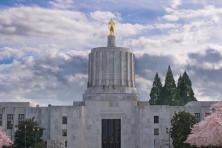Contact:
Kimberly Larson, Climate Solutions, 206-388-8674
Nick Abraham, Washington Environmental Council, 206-833-7021
Puget Sound Clean Air Agency leads innovative effort, proposing strongest Clean Fuel Standard in country that sets ambitious carbon reduction target and prioritizes investments in highly impacted communities
The Puget Sound region continues to move forward with enacting a Clean Fuel Standard to address the largest source of climate and air pollution, improve public health, and increase choices for cleaner transportation. Yesterday afternoon, the Puget Sound Clean Air Agency (PSCAA) released a draft rule on a regional Clean Fuel Standard, a bold action to reduce air pollution and global warming emissions. Clean Fuel Standards have been effective for Washington’s West Coast neighbors California, Oregon, and British Columbia. A regional clean fuels policy across the Puget Sound region —Kitsap, Snohomish, King, and Pierce Counties—would create a market approximately the same size as the market for Oregon’s Clean Fuels Standard, while improving air quality in some of the most polluted freeway corridors.
Cleaner air and a healthier climate
Transportation pollution continues to be one of the largest sources of air pollution linked to asthma, lung cancer, and other respiratory diseases. California’s Clean Fuels program has already resulted in $1.84 million in avoided health care costs, and early numbers from Oregon’s program indicate millions of dollars will be invested in zero-emission electric vehicles and electric vehicle infrastructure.
The American Lung Association, WA Physicians for Social Responsibility, and the Washington Academy of Family Physicians see a Clean Fuel Standard as one of the most important ways to improve public health by decreasing sources of air pollution. Reduced emissions and cleaner air have direct positive health impacts and reduce costs of public health across all communities. With this policy, health groups feel the PSCAA has shown dedication to its mandate to protect and improve local air quality and reduce climate pollution.
"The American Lung Association State of the Air 2019 report found that the Seattle-Tacoma area faces some of the most difficult air pollution challenges in the United States, ranking among the ten most impacted by short term particle pollution,” said Carrie Nyssen, Senior Director of Advocacy for the American Lung Association in Washington. “Transportation emissions and worsening air quality are directly linked to increased public health risks such as heart and lung disease, lost work days, and premature deaths. We support the efforts of the Puget Sound Clean Air Agency to address and prioritize our region’s climate and the health of our families.”
An ever-growing and broad coalition including public health groups, local elected officials, environmental groups, clean energy businesses, science and medical professionals, and several auto manufacturers —including the Alliance of Automobile Manufacturers and Global Automotive Alliance—strongly support clean fuels policies. Clean Fuel Standard policies are essential to the transition to cleaner vehicles and low-carbon fuels that benefit businesses and the broader regional and statewide economy.
The first step in choosing cleaner transportation
Washingtonians spend about nine billion annually on gasoline and diesel, much of which Washington State imports, while many locally-produced clean fuels are shipped to other states that already have a Clean Fuel Standard. By implementing a Clean Fuel Standard in four counties, the Puget Sound region would keep more dollars in the state and take on one of its largest source of climate pollution: transportation. The PSCAA released an economic analysis ahead of the rule, showing that the policy would reduce total cost per-mile traveled for residents, give drivers more clean fuel options, and significantly reduce climate emissions and harmful air pollutants, all while helping to continue to grow the region’s economy and add 330,000 jobs.
Requiring cleaner fuels for internal combustion engines is the baseline for creating pathways towards cleaner transportation options, like adding electric vehicle infrastructure, exploring electric vehicle car sharing programs, and clean biodiesel. Making the choice for cleaner fuels also goes beyond individual consumer transportation and is already working among large quantity fuel users. With companies, government agencies, and others already considering fleet electrification for future operations, a Clean Fuel Standard will accelerate these trends.
"The future of clean transportation includes renewable fuels like those incentivized with a clean fuel standard. Recology continues to look to renewable natural gas to power our fleets and is piloting exciting large zero-emission vehicles like electric garbage trucks. Garbage trucks are major fuel users and a clean fuel standard would help us diversify the fuels we use, while reducing the environmental impact of an essential public service,” said Quinn Apuzzo, Government and Community Relations Manager at Recology.
The Agency’s Board of Directors, made up of elected officials from across the region, includes county executives, mayors, and council members (full board list here). The Board will decide on the policy in 2020 after a comment period that kicked off on October 9th and ends January 6th, with a public hearing on December 19th.


